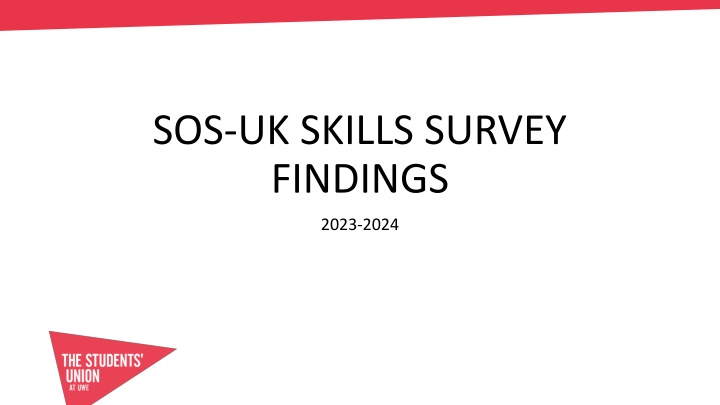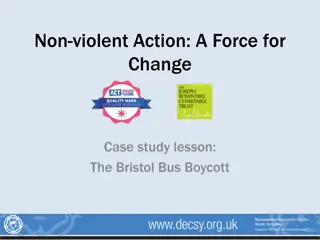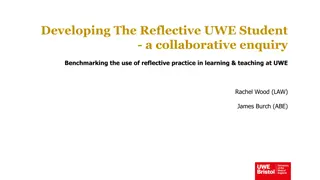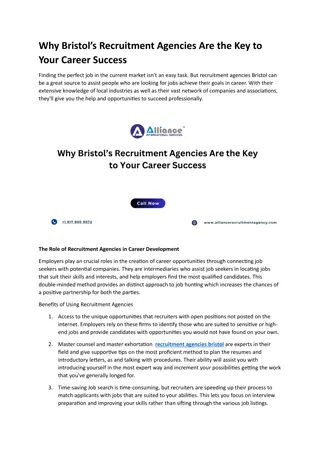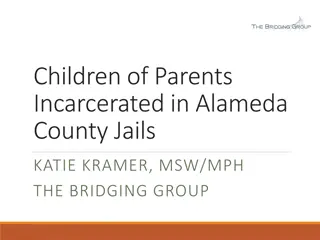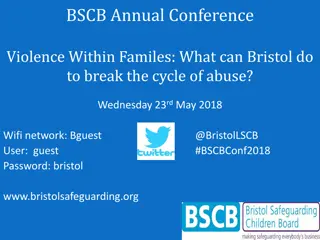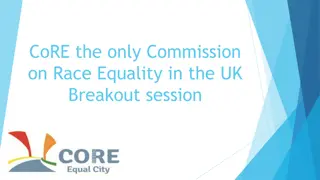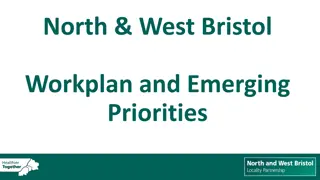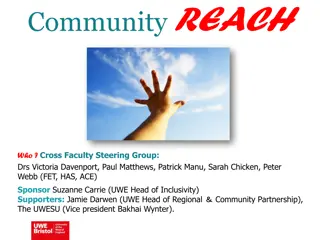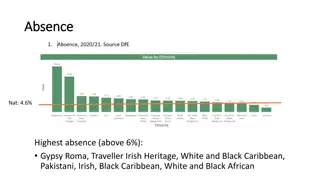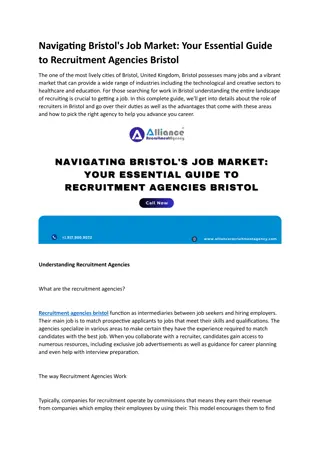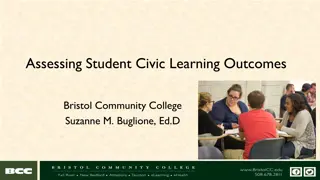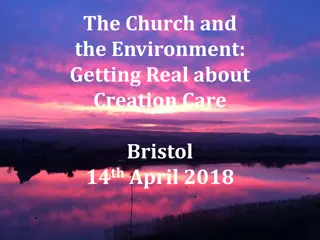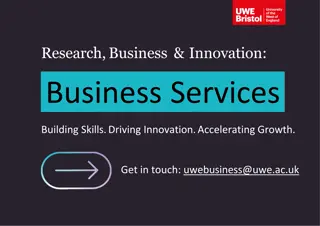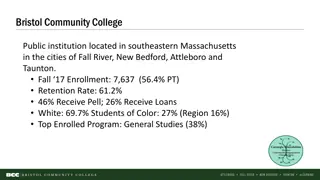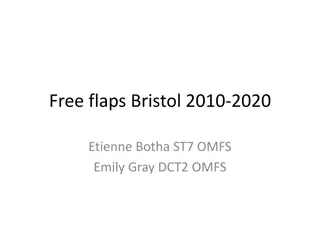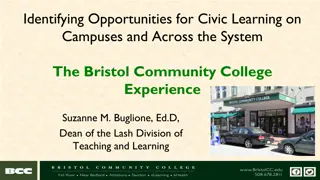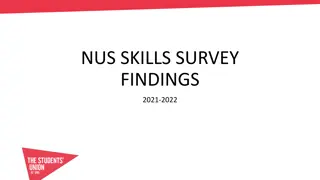UWE Bristol Student Demographics and Study Choices
This report provides insights into the demographics and study preferences of students at UWE Bristol, including information on student backgrounds, courses, subjects of study, ethnicity, gender distribution, and factors influencing their choice of study location.
Download Presentation

Please find below an Image/Link to download the presentation.
The content on the website is provided AS IS for your information and personal use only. It may not be sold, licensed, or shared on other websites without obtaining consent from the author.If you encounter any issues during the download, it is possible that the publisher has removed the file from their server.
You are allowed to download the files provided on this website for personal or commercial use, subject to the condition that they are used lawfully. All files are the property of their respective owners.
The content on the website is provided AS IS for your information and personal use only. It may not be sold, licensed, or shared on other websites without obtaining consent from the author.
E N D
Presentation Transcript
SOS-UK SKILLS SURVEY FINDINGS 2023-2024
STUDENT DEMOGRAPHICS 385 UWE Bristol students responded 74% Bachelor s degree course, 18% Master s course, 1% Apprentice, 4% Foundation level, 3% Other. 51% have come straight to University from school, 18% have been away from formal education for 1 year, 19% 2-5 years, 10% more than 5 years. Year of Study 40% 35% 30% 25% 20% 15% 10% 5% 0% 1st Year 2nd Year 3rd Year 4th Year 5th Year or more
SUBJECT OF STUDY Which option best describes your course or degree? Top subjects that students who answered the survey were studying: Retail and commercial enterprise Leisure, travel and tourism Mathematical sciences 1. Social Sciences 13% 2. Business and administrative studies 12% 3. Other 12% Mass communications and documentation Agriculture and related subjects Languages, literature and culture Historical and philosophical studies Physical sciences This is therefore not a representative sample of UWE students. Education Law Humanities Biological sciences Engineering and technology Architecture, building and planning Creative arts and design Computer sciences Medicine, dentistry and related subjects Other Business and administrative studies Social sciences 0% 2% 4% 6% 8% 10% 12% 14%
STUDENT DEMOGRAPHICS Ethnicity White Roma Latin/South/Central American Students Citizenship White Scottish Mixed / multiple ethnic White and black African 2% 2% Any other mixed / multiple ethnic background I am an international student from within the EU studying in the UK 8% Any other ethnic group 8% Asian or Asian British Bangladeshi I am a UK citizen studying in the UK Mixed / multiple ethnic White and Asian Arab I am an international student from within the EU studying in the UK White Welsh I would prefer not to say Other Black/African/Caribbean/Black British African Asian or Asian British Indian 80% I would prefer not say Asian or Asian British Chinese Any other white background Any other Asian / Asian British background White British White English 0 5 10 15 20 25 30 35 40 45
STUDENT DEMOGRAPHICS Gender 2% 4% 29% Woman Man Non-binary Rather not say 65%
CHOOSING WHERE TO STUDY What UWE students found the most important when choosing where to study: 90% - The employment prospects after completing the course 87% - The reputation of the course 85% - The teaching methods 81% - The reputation of the place of study 79% - The entry requirements The least important: 41% - The nightlife 56% - How seriously it takes global development issues 59% - How seriously it takes environmental issues 62% - How close the place of study was to my home
MORE DETAILS ABOUT CHOOSING WHERE TO STUDY How important were the following when choosing where to apply? Nightlife The position of the place of study in league tables 59% thought How the institution takes environmental issues was important when choosing their place of study. How seriously the place of study takes global development issues The position of the course in league tables How seriously the place of study takes environmental issues How close the place of study was to my home Attractiveness of location The reputation of the place of study The entry requirements The teaching methods Reputation of the course Employment prospects after completing the course 0 50 100 150 200 250 300 350 Very Important Somewhat Important Neither Important nor Unimportant Somewhat unimportant Very unimportant Don t know Rather not say
WHY STUDENTS ARE TAKING THEIR COURSE What were the main reasons for taking the course(s)/apprenticeship you're currently taking? Main reasons were: Other To mix with different types of people To gain qualifications To improve my ability to make a difference to the environment It was the natural progression for me Improve chances of getting a job For the experience I have always wanted to To improve my earning potential To learn more about interesting subjects To improve my ability to make a difference to other people To challenge myself To learn more about interesting subjects To improve my chances of getting a job To gain qualifications 0% 10% 20% 30% 40% 50% 60%
SKILLS AND KNOWLEDGE IN THEIR COURSES 70% said they had covered ethical issues linked to their subject, and 79% said this was personally important to them to learn. Only 42% said they had covered the causes of inequality in the world, but 82% said this is personally important for them to learn. Only 37% said they had covered how to use resources efficiently to limit the impact on the environment and other people, but 72% said this was important for them to learn. Only 42% said they had covered understanding how human activity is affecting nature, but 78% said this was important for them to learn. Additionally, 84% agreed that places of study like theirs should be obliged to develop students' social and environmental skills as part of their courses. This is compared to 80% in 2021-22.
EMBEDDING SKILLS AND KNOWLEDGE IN THEIR COURSE What do you think the most relevant way of including the skills and knowledge needed to help other people and the environment within your own course/apprenticeship would be? 85% thought that offering placements or work experience was relevant. 79% thought that linking coursework, projects or dissertations to the issues was relevant. 76% thought that building the material into the existing content in the course was relevant. 76% thought that running voluntary activities for all students (e.g. within the students' union) was relevant. 74% thought that running voluntary activities linked to their course was relevant. 63% thought that adding a specific module to the course was relevant. See next slide for graph
EMBEDDING SKILLS AND KNOWLEDGE IN THEIR COURSE What do you think the most relevant way of including the skills and knowledge needed to help other people and the environment within your own course / apprenticeship would be? Add a specific module to the course Run voluntary activities linked to my course Run voluntary activities for all students (e.g. within the students' union) Build the material into the existing content in the course Link coursework, projects or dissertations to the issues) Offer placements or work experience 0 50 100 150 200 250 300 350 Extremely relevant Somewhat relevant Neither relevant nor irrelevant Somewhat irrelevant Extremely irrelevant Don t know Rather not say
FUTURE EMPLOYERS AND JOBS Thinking about your future employer, how important, if at all, do you think the following factors will be when considering which jobs to apply for Communicating complex information clearly and effectively to different types of people Understanding how to create change Deemed most important Planning for the long term, as well as the short term Solving problems by thinking about whole systems including different connections and interactions Looking at a problem using information from different subjects or disciplines Looking at global problems from the perspective of people from around the world Understanding how human activity is affecting nature Challenging the way we do things now (like business, politics, education) Deemed least important Considering ethical issues linked to your subject Using resources efficiently to limit the impact on the environment and other people The causes of inequality in the world 0 50 100 150 200 250 300 350 400 Very important Somewhat important Neither important nor unimportant Not important Not important at all Don t know Rather not say
FUTURE EMPLOYERS AND JOBS 75% would take a job that had a starting salary of 1000 lower than average ( 20,000) in a company with a strong environmental and social record. However, this decreased to 51% when a starting salary of 3000 higher than average ( 20,000) was offered. When considering which jobs to apply for in the future . 80% thought that a chance to work in a business / organisation that makes a difference to social and environmental issues, was an important factor. (A 5% increase from last year). 69% thought that a role that contributes to helping the environment was an important factor. 78% thought that a role that contributes to the development within the local community was important. The above were not considered as important as a good starting salary (89%).
PERCEPTIONS OF UWE AND THE STUDENTS UNION 79% agreed that UWE is taking action to limit the negative impact it has on the environment and society. 79% agreed that The Students Union takes action to limit the negative impact it has on the environment and society, compared with 72% last academic year. 72% agreed that being a student at UWE encourages them to think and act to help the environment, and other people, compared with 70% last year.
SUSTAINABLE DEVELOPMENT AT UNIVERSITY 88% of respondents agreed that sustainable development is something which places of study/apprenticeships should actively incorporate and promote. 80% think sustainable development is something which all university courses should actively incorporate and promote. 73% agreed that sustainable development is something all course tutors /teachers/training providers should be required to incorporate within their teaching. 62% of respondents said sustainable development is something which they would like to learn more about, however, this is a small decrease from 67% last year (and 73% the year before). This may be due to more people know about sustainable development from other sources.
WHAT THEYVE LEARNED IN THEIR COURSE 36% said they had learned about biological diversity and nature at university, only 8% had not learned this yet. 42% said they had learned about consumerism, global and ethical trade at university, only 15% had not learned this yet. 32% said they had learned about ecosystems and ecological principles at university, 11% had not learned this yet. 35% said they had learned about rural and urban development at university, 16% had not learned this yet. 49% said they had learned about social justice at university, 15% had not learned this yet. 53% said they had learned about climate change at university, 3% had not learned this yet. 42% said they had learned about waste, water, energy, 8% had not learned this yet. 35% said they had learned about colonialism and its influences in the past and today, 19% had not learned this yet.
WHAT THEYVE LEARNED IN THEIR COURSE continued 59% said they had learned about accountability and ethics at university, only 10% had not learned this yet. 31% said they had learned about citizenship and democracy at university, only 15% had not learned this yet. 43% said they had learned about corporate social responsibility/business ethics at university, 23% had not learned this yet. 63% said they had learned about cultural diversity and equality at university, 3% had not learned this yet. 54% said they had learned about health and wellbeing at university, 6% had not learned this yet. 55% said they had learned about human rights at university, 6% had not learned this yet.
What impact, if any, has learning about any of the issues in the previous question had on you personally? Please write your answer in the box below, thinking about how learning affected your day to day lifestyle as well as bigger changes such as your values and your aims for your future career. Learning about colonialism in science, especially ecology and conservation, has changed my perspective on how research and conservation should be carried out in other countries - there should be collaboration with researchers in these countries 75% said it impacted them positively 3% said it impacted them negatively Only 9% said that it didn t impact them. I'm more aware of greenwashing and how widespread it is I get very overwhelmed and depressed/anxious thinking about the future Changed how I view myself and my place within the world, in terms of relating to others, being part of a local wider and global community, and my relationship with nature and the earth I'm much more depressed about the probable fate of the world, and the actions of humans historically. It has made me be more considerate in terms of personal waste habits, such as the importance of recycling, avoiding plastics and other finite recources, and being more conscious and mindful, and critically reflect on our current climate crisis.
Answers continued Learning about issues related to sustainable development has made me more aware of social responsibility, changed my daily lifestyle, and profoundly influenced my career goals. I hope to integrate these principles into my future career. Has definitely heightened my awareness of the issues and made me more passionate about creating change. Also has increased anxiety of the issues but this is not a bad thing as people should be anxious about the condition of the planet I don't know whether it has, I am naturally a thoughtful person, so I don't think it has impacted my values and aims for my future career is currently just to get in to my chosen industry. I love learning and finding out about different perspectives. This helps me live a more reflective and considered life, both at work and in studying. Learning about these issues has led to a more informed understanding of our world and the society we live in. I feel that I have grown as an individual and each institution/workplace that has contributed to broadening my mindset has led to me developing the skill of awareness and accountability of the reach of these factors.
CLIMATE EDUCATION 86% of respondents agreed that through their time in education so far they ve learned what climate change is and how it happens. 81% agreed that they ve learned what they can do at local and global levels to lessen climate change. 69% agreed that they ve learned what their daily lives will look like as a result of climate change. Only 48% agreed that they ve learned what their jobs will look like as a result of climate change.
COLONIALISM 76% of respondents agreed that through their time in education so far they ve learned about perspectives from cultures around the world. 69% of respondents agreed that through their time in education so far they ve learned about perspectives from groups underrepresented in our society. 53% of respondents agreed that through their time in education so far they ve learned how the ways in which they are taught and the content they learn has been influenced by processes like colonialism (compared to 47% last year).
PLACES OF STUDY ACTING ON CLIMATE What place where you have studied acted to reduce it's negative impact on the environment and society the most? 60% 52% University 52% Secondary education 18% College 10% Don't know 7% Primary education 7% Other place of study 3% I ve not learnt this yet 3% 50% 40% 30% 18% 20% 10% 10% 7% 7% 3% 3% 0% Primary education Secondary education College University Other place of study e.g. training provider, apprenticeship I've not learnt this yet Don't know
STUDENTS IDEAS TO IMPROVE ON SUSTAINABLE DEVELOPMENT The survey asked students: Do you have any suggestions on what actions you would like to see your place of study / apprenticeship take to improve its performance on sustainable development? We had some fascinating responses to this question, there is more information about what respondents said on the following slide, but some topics mentioned were as follows: Sustainability/climate education within the curriculum: this was mentioned most frequently by respondents. The second highest-mentioned topics were, More events and activities on sustainable development, and how sustainable development items (e.g., information, progress, opportunities, etc.) are communicated. The third highest-mentioned topic was Waste reduction. Interestingly, the fourth highest comment from respondents was that the University and Students Union were already doing well. The fifth most mentioned topic was providing more opportunities and experiences within sustainable development. Other topics mentioned included: Renewables and energy usage, improving sustainable transport, sustainable food, raising awareness and water usage.
EDUCATION FOR SUSTAINABLE DEVELOPMENT Slide 1 First, investing in energy-efficient infrastructure and renewable energy sources on campus can significantly reduce its carbon footprint. Implementing sustainable transportation options, such as electric vehicle charging stations and bike-sharing programs, can encourage eco-friendly commuting. Promoting eco-conscious practices like recycling, reducing single-use plastics, and minimizing waste in its procurement processes is crucial. Moreover, integrating sustainability into the curriculum and fostering partnerships with local communities can enhance environmental education and engagement. By achieving recognized sustainability certifications and consistently reporting on progress, UWE Bristol can lead by example in sustainable development. By providing lectures on how sustainable development can be implemented in a routine. be part of the course Modules and optional activites Incorporated more into uni, potential courses or lectures you could take to learn more Make part of module requirements Incorporate learning into modules More societies about it. More awareness in courses. It has to improve their teaching methods, and should personally indulge in every student It needs to be intertwined, innate, in our learning. It cannot feel forced or be the "environmental module". Our future requires this to be muscle memory. Offer work experience in these sectors to all students Education in the course More work and volunteering opertunities that support that Teach us and communicate well any opportunities to learn Integrate seminars and courses into each course Make sustainable curriculum options more openly advertised and available Workshops, study days involving these topics, projects fitting sustainable briefs etc Include it into all courses. To incorporate it into existing modules using case studies Workshops and seminars to bring attention to sustainability and using it in development incorporate sustainable thinking into assignments and coursework. Ensure any design solutions have been considered for the ir environmental impact. Make sustainability part of the marking criteria to ensure students give it value More 'real world' examples and case studies of advancements in the industry. Make some practical tasks/coursework based on it There needs to be more lecturers that have a focus on the environment. There is currently one photographer lecturer that has spoke a lot about sustainability, and every other one doesn t mention the environment in their own work. Include it in the realm of a geographical perspective.
EDUCATION FOR SUSTAINABLE DEVELOPMENT Slide 2 Optional modules on working to incorporate sustainable development in work fun and interesting workshops and seminars for students to help them engage with sustainability. Incorporate the topic in a way that is relevant to the course of study in lectures Additional modules and interactive sessions like quizzes and questionnaires that will catch the interest of busy students. Implementing a largely plant based food system. Creating policies about waste production. Speaking up and making statements on current political and social injustices. Reporting on protest/ activism work that students are involved in. Looking towards new ways to merge courses/tutors etc so we have a broader depth of understanding on current issues. Taking more input from students about what should be changed as the world changes. Integrating sustainable development within their curriculum, not just offering volunteering options, etc. Many students do not find the time for these activities, whether this be because of work commitments, or otherwise. If the curriculum were to have an intentional focus on elements on how their course relates to sustainable development, it would enable students during class time to begin developing their knowledge, especially so for projects that focus on these issues. I would like to see sustainable development included in most courses to avoid the 'green washing' which occurs when 'marketing and business' type degrees/graduates use the concept to sell products without questioning the very concepts of 'growth' and 'consumption' as a problematic narrative. I can see how in the 'hard sciences' it is much harder to incorporate ideas about sustainable development, but in most 'applied' subjects it is very possible and desirable. I would like lecturers and teachers to at least have some basic knowledge about it and incorporate into students learning Encourage students from non- traditionaly sustainable courses eg aerospace and engineering to actively prepare for a sustainable future. Education in the course I would like to see more encouragement from course leaders and staff for us to engage with the sustainable teaching we have been offered. Content in person as well as online lectures! wish to see sustainable practices like recycling programs, energy-efficient buildings, and curriculum that emphasizes sustainability at your place of study. Through more case studies. The school should strengthen multicultural education to foster understanding and communication among students from diverse backgrounds. Additional applicable courses to every programme to indoctrinate sustainable development. I think there should be a greater focus on integrating sustainability into engineering projects within my place of study. There is project week for engineering practice, but it would be good to have a higher focus on sustainability in projects for other lectures! More optional workshops or lectures on this matter Maybe one lecture but it s not that important Teaching un-green washed information not spewed by oil/energy companies. Teach practices in agriculture or business towards sustainable development. More teachings of aesthetics that implement sustainable change I believe that a more communal mindset of sustainable development starts with active engagement, dialogue and a deeper thought process to benefit others, not just myself. Opportunities should be presented to engage with related topics to raise awareness and to aid a more informed understanding of sustainability when working. Perhaps an open call in creative fields of study would help connect with the issue and suggesting reading material for each subjects engagement with the issue in general. I would see funding and drive for the optional zero carbon course offered through the built environment society reinvigorated The implementation of more case studies in lectures or extra reading material, that are connected to the matter in hand, sustainable development. Making it the focus of all academic subjects
EVENTS AND ACTIVITES ON SUSTAINABLE DEVELOPMENT More hands-on practice Organise event to encourage people take their own container Optional drop in sessions educating on the topic Modules and optional activites Guided tour around areas thag could be affected by climate change and how Promote more stimulatory situations in which students can understand why it is so important to focus on sustainability Advertise less on instagram and more in person, maybe have stalls on campus with leaflets and flyers and some games to play which then tell you more about sustainable development Workshops more workshops More education and focus on the sustainable development goals More societies about it. More awareness in courses. More guest speakers on sustainable development or the climate crisis, to encourage more students to take an interest and care about the subject workshops/activities More swap shop Talking about it at uni and events Masterclass talks I think group work activity would be best and getting us out in the community but this would be in person and practical rather than anything online Workshops, study days involving these topics, projects fitting sustainable briefs etc Incorporate sessions about it with outside speakers Workshops and seminars to bring attention to sustainability and using it in development i would love to see each students aims to save energy, resources that are available within their own surroundings.And launching every events that relates to sustainable development is must in every public placed or academic industries. By working on all three pillars of sustainability viz environment, economy and society. Implemnting programs for community well being. fun and interesting workshops and seminars for students to help them engage with sustainability. Offer gardening classes or teach us how to be self sufficient and grow or own food. Provide classes on how to produce less waste or reuse. Place posters all around campus reminding people to recycle and be real with us by showing pictures of landfill sites and the devastation we've caused through imagery. We need to be reminded constantly of our own impact on the environment. Litter picking opportunities as a group. More optional workshops or lectures on this matter Promote sustainable transportation. This could include providing incentives for students and staff to use public transportation, bike, or walk to campus. Support sustainability research and innovation. This could involve funding research projects, providing startup support for sustainable businesses, and hosting events and workshops on sustainability. Engage with the local community on sustainability issues. This could involve partnering with local organizations to work on sustainability projects, hosting community events, and offering volunteer opportunities for students and staff. Present of more interactive educational workshops to increase the knowledge of students Wealth Distribution, Political Activism, transparent accounting. I don't think UWE is going to become a bastion of SD research, so I would prefer it take a social role in improving peoples lives so they can focus on it more Events and activities
COMMUNICATING SUSTAINABLE DEVELOPMENT Advertise less on instagram and more in person, maybe have stalls on campus with leaflets and flyers and some games to play which then tell you more about sustainable development being transparent about the physical new developments that they are building currently More information on this subject, easily accessible. Incorporate more information / discussion on sustainable development relevant to my course (heavily internet-centred). Teach us and communicate well any opportunities to learn Actually meeting the people in each society at freshers rather than one person just showing us a list of them all. Incorporate more environmental messages in films students make. Less promotion, more action Encourage staff /students to adopt sustainable practice Not make it a thing that only sustainable development/environmental students and the green team are concerned about. SD takes everyone, at every age and from every walk of life. It should be something that the whole campus can talk about, and, in particular, NEW IDEAS and solutions should be encouraged without judgement. Physical permanent signs should be up that explain to everyone how the campus and the uni are sustainable with a QR code where new ideas for improvements can be submitted. The uni's approach to sustainability should go beyond their own campus - they should be actively engaging with Bristol and South Glouc to support and fund sustainable practices and be measuring their success on the number of students graduating with a passion and understanding for sustainability. get students involved in the planning process to have a variety of ideas Reminders of more sustainable practices. actively promoting what is being developed and taught i would love to see each students aims to save energy, resources that are available within their own surroundings.And launching every events that relates to sustainable development is must in every public placed or academic industries. Suggestions to students in different ways More visual presence throughout the university. keep providing information and resources Email out regular information on sustainability and how to make sustainable choices that are still budget friendly for students. As sustainability can sometimes be more expensive Show statistics on energy from solar power or plastic recycled Continue recycling and showing your appreciation for being a sustainable place. Offer gardening classes or teach us how to be self sufficient and grow or own food. Provide classes on how to produce less waste or reuse. Place posters all around campus reminding people to recycle and be real with us by showing pictures of landfill sites and the devastation we've caused through imagery. We need to be reminded constantly of our own impact on the environment. Implementing a largely plant based food system. Creating policies about waste production. Speaking up and making statements on current political and social injustices. Reporting on protest/ activism work that students are involved in. Looking towards new ways to merge courses/tutors etc so we have a broader depth of understanding on current issues. Taking more input from students about what should be changed as the world changes. I would like to see the Student Union at our university to work more towards the sustainability development, take it more seriously rather than just doing it as a formality. It feels like there are more words than actions, it should be the other way around. Make it known to students what the sustainability development goals are and provide more resources into that, the more people know about it the better I think. My place of study, as all places of study, prioitise money over sustainability. For example, this year they took on several outlets on campus, all of which are large chains (Greggs, Starbucks, Morrisons etc), where they could have taken on local, small business to contribute to community. They allow plastic packaging and cup lids to be used across campuses. Their recycling bins are awful (although their waste company is good). My university does little to engage students in sustainability. For example, they could put up infographics to outline easy, environmentally positive changes. They refuse to change their meat to veggie meal ratio despite years of student campaigning. Worse still, their veggie meals are usually more expensive than the meat (such as 'eat for less' initiative which allows meat meals to be cheaper and discriminates vegans)! They have large info screens that light up adverts and info and use electricity all day and night. I could go on... More campaigns to promote sustainability I believe that a more communal mindset of sustainable development starts with active engagement, dialogue and a deeper thought process to benefit others, not just myself. Opportunities should be presented to engage with related topics to raise awareness and to aid a more informed understanding of sustainability when working. Perhaps an open call in creative fields of study would help connect with the issue and suggesting reading material for each subjects engagement with the issue in general. More promotion and inclusivity, more points of discussion around the topic. Wealth Distribution, Political Activism, transparent accounting. I don't think UWE is going to become a bastion of SD research, so I would prefer it take a social role in improving peoples lives so they can focus on it more Communication
REDUCE WASTE FOR SUSTAINABLE DEVELOPMENT Better recycling facilities First, investing in energy-efficient infrastructure and renewable energy sources on campus can significantly reduce its carbon footprint. Implementing sustainable transportation options, such as electric vehicle charging stations and bike-sharing programs, can encourage eco-friendly commuting. Promoting eco-conscious practices like recycling, reducing single-use plastics, and minimizing waste in its procurement processes is crucial. Moreover, integrating sustainability into the curriculum and fostering partnerships with local communities can enhance environmental education and engagement. By achieving recognized sustainability certifications and consistently reporting on progress, UWE Bristol can lead by example in sustainable development. Increase incentives to travel by bus instead of driving, and reduce non-recyclabe packaging Actually recycling, since I've watched on numerous occasions, the site team pouring the recycling into the same bag as the waste. Better recycling/ teaching students how to recycle properly More recycling bins around campus Simple things like more separated recycling bins (I often carry around apple cores with me looking for a suitable food bin). A bigger fee on take away coffee cups, a tax on single use water bottles, better connected local public transport (a friend drives to uni because taking two buses would take over twice as long). Reduced use of single use plastics Cut down on takeaway food packaging, have canteen style food on washable trays Continue recycling and showing your appreciation for being a sustainable place. uwe is fantastic for this but one thing id mention is there is no place that i know of for foodwaste such as banana skins / apple cores Implementing a largely plant based food system. Creating policies about waste production. Speaking up and making statements on current political and social injustices. Reporting on protest/ activism work that students are involved in. Looking towards new ways to merge courses/tutors etc so we have a broader depth of understanding on current issues. Taking more input from students about what should be changed as the world changes. The milk cartons in the SU BYOC area have to be recycled at a big recycling centre and cannot be recycled at the university so they end up going into the general rubbish. This could be improved. wish to see sustainable practices like recycling programs, energy-efficient buildings, and curriculum that emphasizes sustainability at your place of study. My place of study, as all places of study, prioitise money over sustainability. For example, this year they took on several outlets on campus, all of which are large chains (Greggs, Starbucks, Morrisons etc), where they could have taken on local, small business to contribute to community. They allow plastic packaging and cup lids to be used across campuses. Their recycling bins are awful (although their waste company is good). My university does little to engage students in sustainability. For example, they could put up infographics to outline easy, environmentally positive changes. They refuse to change their meat to veggie meal ratio despite years of student campaigning. Worse still, their veggie meals are usually more expensive than the meat (such as 'eat for less' initiative which allows meat meals to be cheaper and discriminates vegans)! They have large info screens that light up adverts and info and use electricity all day and night. I could go on... Maybe encouraging students to recycle more, avoid use of plastic in the college. Adding the option of Using water in toilets rather than toilet paper every time. More recycling Reduce waste
UWE AND THE SU AT UWE ARE ALREADY DOING GREAT THINGS FOR SUSTAINABLE DEVELOPMENT se are doing very well to be sustainable there are lots of info and green events They are already education us on the ethics and solutions No, I think that UWE has a very environmentally conscious approach throughout. I think that UWE Bristol is making very good progress in terms of sustainable development and does not require any sort of suggestions. No. My place of study is very good at this. My course is WECS so I imagine its already doing alot :) keep providing information and resources My place of study covers a lot of good sustainable options and alternatives Already doing well i think my university have a good track record on sustainable development. uwe is fantastic for this but one thing id mention is there is no place that i know of for foodwaste such as banana skins / apple cores Continue recycling and showing your appreciation for being a sustainable place. I really like the approach that UV University has, because it deals with it in all aspects, from various events, awards, materials used in buildings, etc. I think our university can be a good example for others. They have already included in the process They are already doing well in that aspect. I feel like my university is really trying its best for sustainable development so I'm not too sure.
PROVIDING MORE OPPORTUNITIES AND EXPERIENCES WITHIN SUSTAINABLE DEVELOPMENT Placement year? Modules and optional activites Offer work experience in these sectors to all students More work and volunteering opertunities that support that Better placement options I think group work activity would be best and getting us out in the community but this would be in person and practical rather than anything online More hands-on practice get students involved in the planning process to have a variety of ideas Have paid voluntary programs More practical engagement opportunities Provide a placement to get experience in the sustainability sector. Opportunities and experience I believe that a more communal mindset of sustainable development starts with active engagement, dialogue and a deeper thought process to benefit others, not just myself. Opportunities should be presented to engage with related topics to raise awareness and to aid a more informed understanding of sustainability when working. Perhaps an open call in creative fields of study would help connect with the issue and suggesting reading material for each subjects engagement with the issue in general. Promote sustainable transportation. This could include providing incentives for students and staff to use public transportation, bike, or walk to campus. Support sustainability research and innovation. This could involve funding research projects, providing startup support for sustainable businesses, and hosting events and workshops on sustainability. Engage with the local community on sustainability issues. This could involve partnering with local organizations to work on sustainability projects, hosting community events, and offering volunteer opportunities for students and staff.
OTHER IDEAS TO IMPROVE ON SUSTAINABLE DEVELOPMENT First, investing in energy-efficient infrastructure and renewable energy sources on campus can significantly reduce its carbon footprint. Implementing sustainable transportation options, such as electric vehicle charging stations and bike-sharing programs, can encourage eco-friendly commuting. Promoting eco-conscious practices like recycling, reducing single-use plastics, and minimizing waste in its procurement processes is crucial. Moreover, integrating sustainability into the curriculum and fostering partnerships with local communities can enhance environmental education and engagement. By achieving recognized sustainability certifications and consistently reporting on progress, UWE Bristol can lead by example in sustainable development. Use more natural sunlight i would love to see each students aims to save energy, resources that are available within their own surroundings.And launching every events that relates to sustainable development is must in every public placed or academic industries. I would like them to investigate renewable power sources for campus buildings and electrics wish to see sustainable practices like recycling programs, energy-efficient buildings, and curriculum that emphasizes sustainability at your place of study. My place of study, as all places of study, prioitise money over sustainability. For example, this year they took on several outlets on campus, all of which are large chains (Greggs, Starbucks, Morrisons etc), where they could have taken on local, small business to contribute to community. They allow plastic packaging and cup lids to be used across campuses. Their recycling bins are awful (although their waste company is good). My university does little to engage students in sustainability. For example, they could put up infographics to outline easy, environmentally positive changes. They refuse to change their meat to veggie meal ratio despite years of student campaigning. Worse still, their veggie meals are usually more expensive than the meat (such as 'eat for less' initiative which allows meat meals to be cheaper and discriminates vegans)! They have large info screens that light up adverts and info and use electricity all day and night. I could go on... Renewables and energy First, investing in energy-efficient infrastructure and renewable energy sources on campus can significantly reduce its carbon footprint. Implementing sustainable transportation options, such as electric vehicle charging stations and bike-sharing programs, can encourage eco-friendly commuting. Promoting eco-conscious practices like recycling, reducing single-use plastics, and minimizing waste in its procurement processes is crucial. Moreover, integrating sustainability into the curriculum and fostering partnerships with local communities can enhance environmental education and engagement. By achieving recognized sustainability certifications and consistently reporting on progress, UWE Bristol can lead by example in sustainable development. Better quality building on campus, more sustainable travel options (i.e. more encouragement to use public transport) Increase incentives to travel by bus instead of driving, and reduce non-recyclabe packaging Simple things like more separated recycling bins (I often carry around apple cores with me looking for a suitable food bin). A bigger fee on take away coffee cups, a tax on single use water bottles, better connected local public transport (a friend drives to uni because taking two buses would take over twice as long). Help improve the local public transport Promote sustainable transportation. This could include providing incentives for students and staff to use public transportation, bike, or walk to campus. Support sustainability research and innovation. This could involve funding research projects, providing startup support for sustainable businesses, and hosting events and workshops on sustainability. Engage with the local community on sustainability issues. This could involve partnering with local organizations to work on sustainability projects, hosting community events, and offering volunteer opportunities for students and staff. Improve sustainable transport
OTHER IDEAS TO IMPROVE ON SUSTAINABLE DEVELOPMENT cheaper food Implementing a largely plant based food system. Creating policies about waste production. Speaking up and making statements on current political and social injustices. Reporting on protest/ activism work that students are involved in. Looking towards new ways to merge courses/tutors etc so we have a broader depth of understanding on current issues. Taking more input from students about what should be changed as the world changes. My place of study, as all places of study, prioitise money over sustainability. For example, this year they took on several outlets on campus, all of which are large chains (Greggs, Starbucks, Morrisons etc), where they could have taken on local, small business to contribute to community. They allow plastic packaging and cup lids to be used across campuses. Their recycling bins are awful (although their waste company is good). My university does little to engage students in sustainability. For example, they could put up infographics to outline easy, environmentally positive changes. They refuse to change their meat to veggie meal ratio despite years of student campaigning. Worse still, their veggie meals are usually more expensive than the meat (such as 'eat for less' initiative which allows meat meals to be cheaper and discriminates vegans)! They have large info screens that light up adverts and info and use electricity all day and night. I could go on... Food Increasing awareness and student involvement More societies about it. More awareness in courses. Aim to make students more aware of the sustainable development plans/events put on To bring more urgent awareness to environmental issues to actively encourage students to pursue jobs in the environmental sector. Awareness Possibly incorporating the grey water cycle, meaning tap water around campus can be reused to flush toilets instead of using clean water that will then be immediately disposed of. Water
